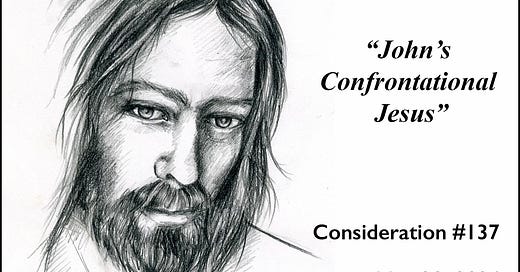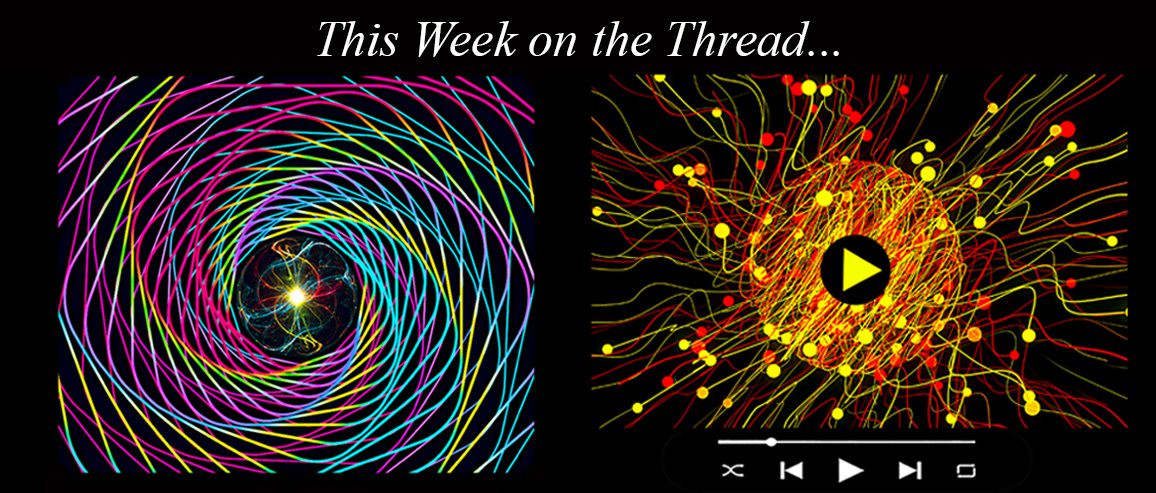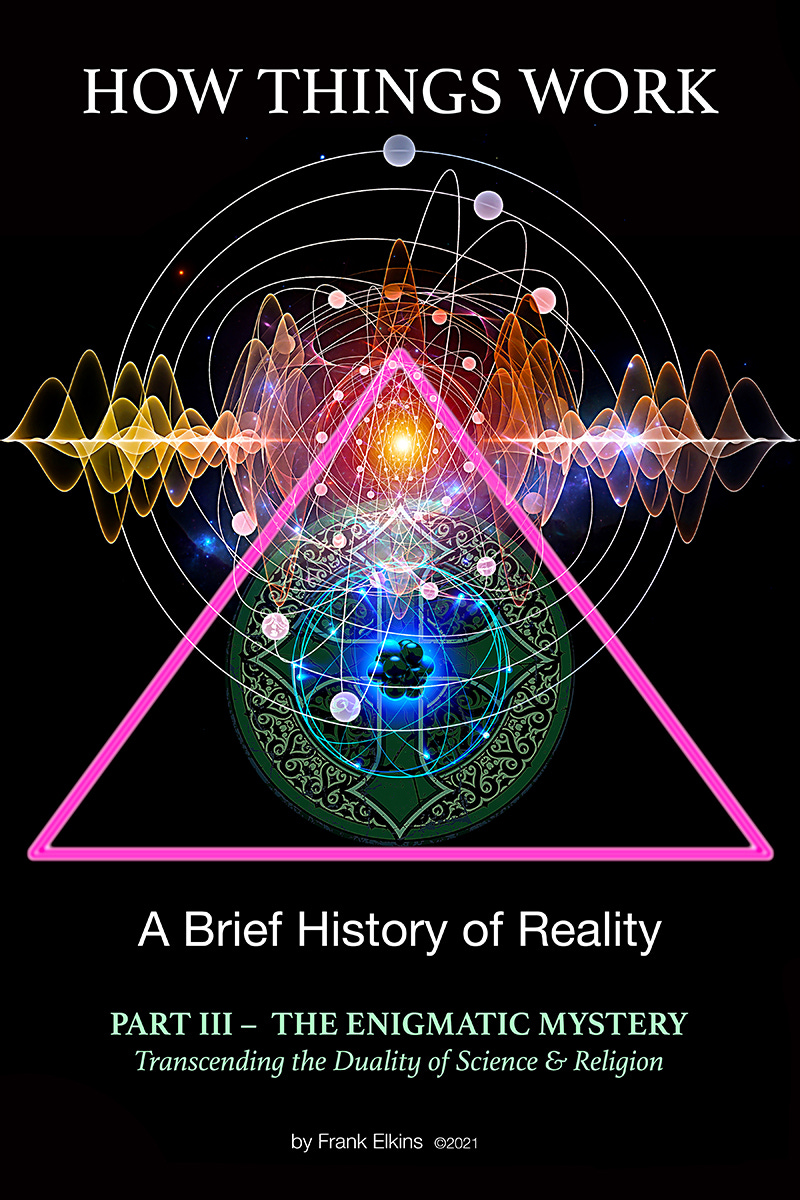John's Confrontational Jesus
HOW THINGS WORK – Consideration #137 (Book II Science & Religion)
Be A Part of the Conversation!
Tuesday May 28, 2014
“…one feature about John’s Gospel that is not mentioned much is the amount of conflict that occurs throughout between Jesus and others. Of its twenty-one chapters, Jesus is in a dispute with someone in almost every chapter. It is breathtaking.”
Cliff McManis – Jesus: The Master of Confrontation
PREFACE
Welcome Everybody!
The degree to which Jesus argues against the Jewish leadership increases and takes on a much more aggressive tone in John. Jesus does not use parables to confuse his message and is often direct and confrontational when proclaiming his true identity and mission.
To the Jews who had believed him, Jesus said, “If you hold to my teaching, you are really my disciples. Then you will know the truth, and the truth will set you free.”
They answered him, “We are Abraham’s descendants and have never been slaves of anyone. How can you say that we shall be set free?”
Jesus replied, “Very truly I tell you, everyone who sins is a slave to sin…
Jesus said to them, “If God were your Father, you would love me, for I have come here from God. I have not come on my own; God sent me. Why is my language not clear to you?
Because you are unable to hear what I say… Yet because I tell the truth, you do not believe me! Can any of you prove me guilty of sin? If I am telling the truth, why don’t you believe me? Whoever belongs to God hears what God says. The reason you do not hear is that you do not belong to God.”
John 8:31-36, 42-47
In John, Jesus upsets some crowds to the point that they literally want to kill him on the spot. When Jesus uses Abraham in a reference to himself, the crowd becomes irate. The description “I Am” is how God describes himself to Moses in the Old Testament; therefore Jesus is stating that “he” is “I Am,” or God. This is based on his statement in John 10:30 that, “I and the Father are one.”
Jesus replied, “If I glorify myself, my glory means nothing. My Father, whom you claim as your God, is the one who glorifies me. Though you do not know him, I know him. If I said I did not, I would be a liar like you, but I do know him and obey his word. Your father Abraham rejoiced at the thought of seeing my day; he saw it and was glad.”
“You are not yet fifty years old,” they said to him, “and you have seen Abraham!”
“Very truly I tell you,” Jesus answered, “before Abraham was born, I am!” At this, they picked up stones to stone him, but Jesus hid himself, slipping away from the temple grounds.
John 8:54-58
In John, Jesus is neither timid nor ambiguous about his message or intention when encountering the Jewish leadership; aggressively and contemptuously pointing out their hypocrisy and inability to grasp his message of redemption. No longer using parables and metaphors to confuse them he confronts them directly, aggressively, explicitly and in public.
CONSIDERATION #137 – John’s Confrontational Jesus
In John’s gospel, even those who have been healed by Jesus are used by the Jewish leadership in their plot to destroy him. However, like Jesus, those receiving his blessings are often portrayed as strongly confronting the Jewish authority and supporting the power and authority of God’s messenger over those who would do him harm. In John, the pure of heart always recognize the essence of who Jesus really is; giving them the confidence to also confront traditional authority.
They brought to the Pharisees the man who had been blind. Now the day on which Jesus had made the mud and opened the man’s eyes was a Sabbath. Therefore the Pharisees also asked him how he had received his sight. “He put mud on my eyes,” the man replied, “and I washed, and now I see.”
Some of the Pharisees said, “This man is not from God, for he does not keep the Sabbath.”
But others asked, “How can a sinner perform such signs?” So they were divided.
Then they turned again to the blind man, “What have you to say about him? It was your eyes he opened.”
The man replied, “He is a prophet.”
John 9:13-17
Once the healed man declares Jesus a prophet the authorities declare that the man was never really blind; demanding direct empirical evidence from the man’s parents.
They still did not believe that he had been blind and had received his sight until they sent for the man’s parents. “Is this your son?” they asked. “Is this the one you say was born blind? How is it that now he can see?”
“We know he is our son,” the parents answered, “and we know he was born blind. But how he can see now, or who opened his eyes, we don’t know. Ask him. He is of age; he will speak for himself.” His parents said this because they were afraid of the Jewish leaders, who already had decided that anyone who acknowledged that Jesus was the Messiah would be put out of the synagogue. That was why his parents said, “He is of age; ask him.”
John 9:18-23
After receiving the proof that they had demanded, the leaders recalled the healed man in an attempt to proclaim his healer a sinner. However, the healed man becomes frustrated with their foolishness and their inability to accept the truth about the situation.
A second time they summoned the man who had been blind. “Give glory to God by telling the truth,” they said. “We know this man is a sinner.”
He replied, “Whether he is a sinner or not, I don’t know. One thing I do know. I was blind but now I see!”
Then they asked him, “What did he do to you? How did he open your eyes?”
He answered, “I have told you already and you did not listen. Why do you want to hear it again? Do you want to become his disciples too?”
John 9:24-27
After this insult the leaders become infuriated with the man; losing their temper and control, allowing the man to mock them even further. And like Jesus, he delivers a message of truth.
Then they hurled insults at him and said, “You are this fellow’s disciple! We are disciples of Moses! We know that God spoke to Moses, but as for this fellow, we don’t even know where he comes from.”
The man answered, “Now that is remarkable! You don’t know where he comes from, yet he opened my eyes. We know that God does not listen to sinners. He listens to the godly person who does his will. Nobody has ever heard of opening the eyes of a man born blind. If this man were not from God, he could do nothing.”
To this they replied, “You were steeped in sin at birth; how dare you lecture us!” And they threw him out.
John 9:28-34
Later, Jesus hears what they had said and done to the man he had healed. He searches for the man who had boldly stood up for him and been thrown out by the Jewish leaders. Jesus accuses them of “spiritual blindness” and rewards the man for his intrepid response.
Jesus heard that they had thrown him out, and when he found him, he said, “Do you believe in the Son of Man?”
“Who is he, sir?” the man asked. “Tell me so that I may believe in him.”
Jesus said, “You have now seen him; in fact, he is the one speaking with you.”
Then the man said, “Lord, I believe,” and he worshiped him.
Jesus said, “For judgment I have come into this world, so that the blind will see and those who see will become blind.”
Some Pharisees who were with him heard him say this and asked, “What? Are we blind too?”
Jesus said, “If you were blind, you would not be guilty of sin; but now that you claim you can see, your guilt remains.”
John 9:35-41
In John, Jesus personifies the “good shepherd” not only as someone who loves and protects his sheep; but also, as someone who makes his sheep stronger and who desires and respects courageous indomitable sheep.
POSTSCRIPT
In John the message is clear, Jesus is the light of the world who reveals the truth of God to mankind: Jesus is the logos. If you embrace this revelation your mortal sins will be forgiven and you will experience the Kingdom of Heaven, otherwise you will die in the empirical world with your mortal sins. However, the Kingdom of Heaven cannot be experienced until after you accept and embrace the truth of Jesus’ revelation and manifestation of the logos.
Again Jesus spoke to them, saying, “I am the light of the world. Whoever follows me will not walk in darkness, but will have the light of life.” So the Pharisees said to him, “You are bearing witness about yourself; your testimony is not true.” Jesus answered, “Even if I do bear witness about myself, my testimony is true, for I know where I came from and where I am going, but you do not know where I come from or where I am going. You judge according to the flesh; I judge no one.
John 8:12-15
Jesus expresses that although he is not here to judge the empirical world his judgment would still be just because he and the Father are one, meaning he also manifests the Father’s judgement; essentially stating that Jesus’ judgment is on a higher plane than the Law. Jesus understands and represents a higher “rational” level of judgment.
Yet even if I do judge, my judgment is true, for it is not I alone who judge, but I and the Father who sent me. In your Law it is written that the testimony of two people is true. I am the one who bears witness about myself, and the Father who sent me bears witness about me.”
John 8:16-18
This encounter takes place in public at the temple. Jesus claims two witnesses to his judgement; his own and his Father’s. According to John, the only reason they do not immediately arrest Jesus is because, “his time had not yet come.”
They said to him therefore, “Where is your Father?” Jesus answered, “You know neither me nor my Father. If you knew me, you would know my Father also.” These words he spoke in the treasury, as he taught in the temple; but no one arrested him, because his hour had not yet come.
John 8:19-20
In the Gospel of John Jesus is more than a Jewish messiah, he is the world’s messiah; the physical incarnation of the logos itself. And in John’s gospel he was not shy about bringing it to the attention of the Jewish authority.
Next week we will consider John’s unique interpretation of the Last Supper…
Expand the Conversation by Upgrading to “Reality by a Thread!”
Excerpt From This Week’s “Untangling the Knots of Reality” Podcast:
• UNTANGLING THE KNOTS OF REALITY: Podcast #97 – “Untangling Newton’s Universal Law of Gravity”
“Why is Newton’s Universal Law of Gravity so remarkable?” “Did apples really have anything to do with Newton’s consideration of gravity?” “What does Newton’s Universal Law of Gravity really mean?” “Why does Newton describe the effects of gravity as opposed to the nature of gravity?” “What is the distinction between the results of classical physics and the results of quantum physics?” These are some of the knots we will attempt to untangle in this week’s podcast. That’s a lot of gravitational force for one podcast! So, let’s get started…
• REALITY BY A THREAD: “Artificial Intelligence Axiom #5” (Excerpt) – “To avoid the common AI scenarios such as the HAL-9000 from 2001: A Space Odyssey, or the Terminator from Skynet, or becoming human batteries like in The Matrix, Artificial Intelligence must have an axiom related to respecting its creator. This is the essential factor in human beings surviving their own creation.”
• FREE PDF DOWNLOADS of Book IV: “The Cosmic Symphony – Overtones of String Theory” plus other Free Books, Discounts and Benefits. Also Gain Complete Access to all Previous Podcasts and Threads!
UPGRADE NOW!
Book III "The Enigmatic Mystery – Transcending the Duality of Science & Religion"
We are now beginning to understand that opposites, like waves and particles, are essentially two ways of looking at the same thing. That “thing” is the mystery. It is now becoming more and more apparent that the mystery science is seeking to understand is ultimately the same mystery religion is seeking to understand. This is the paradox we as human beings are currently facing…
Science doesn’t tell us why the Big Bang happened. It doesn’t tell us anything about what happened before the event itself. It also doesn’t tell us how the singularity occurred in the “first” place or why it decided to explode “when” it did. Science tells us one thing: there is objective scientific evidence, based on Einstein’s theories of relativity, that it did occur. So, what exactly is the Big Bang? (Book III – “The Enigmatic Mystery”)
• What is the distinction between Knowledge, Understanding, and Meaning?
• What is the Scientific Explanation for Reality?
• What is the Theological Explanation for Reality?
• What are the current Unexplained Mysteries of Science?
• What are the Metaphysical Foundations for the Holy Trinity?
• What is the Atomic Trilogy?
• Is the Bible Fiction or Nonfiction?
• What exactly is the Big Bang?
• What are Theoretical Entities?
• Is there a distinction between God and Electrons?
• Is it possible to Transcend Dualism?
AVAILABLE NOW!






